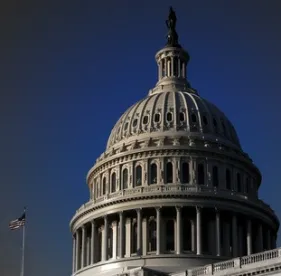Senate Republicans released a coronavirus (COVID-19) relief proposal, but Democrats are likely to pursue passage of a broader package through reconciliation without Republican support. President Joe Biden signed a series of executive orders (EOs) on immigration, including one aimed at reversing the Trump Administration’s public charge rule.
Congress
Bipartisan Compromise on the COVID-19 Relief Package Appears Unlikely
Last week, 10 Senate Republicans released a $618 billion COVID-19 relief bill that includes $160 billion for testing, vaccines, personal protective equipment and the Provider Relief Fund. This bill does not include additional aid for state and local governments, which Democrats have insisted on including. If 10 Republicans joined all Democrats on the package, they could overcome the filibuster in the Senate and pass a bill. But, it is unlikely that all Democrats would support the slimmed-down version, thereby calling into question whether anything emerging from bipartisan compromise could itself get a majority to pass. The White House and congressional Democrats this week positioned themselves to move forward using budget reconciliation, a process requiring only a simple majority vote, but also limiting the scope of the bill to provisions that directly impact federal spending. Democrats are taking steps to enable this option in case they cannot broker a satisfactory compromise with Republicans, and need to advance relief legislation with only Democratic support. The House and Senate passed a budget resolution to lay the groundwork for the reconciliation process, and leadership has suggested that they hope to approve a relief bill in early March. If Democrats resort to reconciliation to move the next COVID-19 relief package, Senator Joe Manchin (D-WV) becomes extremely important. Senator Manchin is a moderate Democrat who votes against his party more than almost any other senator (for example, Senator Manchin voted against the majority of Senate Democrats 24.8% of the time during the 116th Congress according to a ProPublica study). Democrats cannot pass a COVID-19 package through reconciliation without his vote, so his priorities will likely be reflected in a final deal.
Schumer and McConnell Reached Power-Sharing Agreement; Health Committee Shakeups Announced
Senate Majority Leader Chuck Schumer (D-NY) and Minority Leader Mitch McConnell (R-KY) finally (more than four weeks after the 117th Congress convened) agreed to an organizing resolution that specifies how the two parties will share power in the 50/50 split Senate. The resolution gives Democrats and Republicans equal numbers of seats on committees, shared ability to send tied committee votes to the floor and allows Democrats to officially assume their majority position. The lack of an agreement over the last few weeks had created an unusual situation for the 50/50 Senate where Republicans had maintained committee chairmanships and new members could not be added, despite Democrats technically holding the majority. With the agreement in place, the Senate announced new committee assignments. On the health policy front, Senator Elizabeth Warren (D-MA) will join the Finance Committee, which has jurisdiction over Medicare and Medicaid, among other health programs. She is likely to be a leading voice on the committee going forward and may push other Democratic members to the left. Warren vacated a seat on the Senate Health, Education, Labor and Pensions (HELP) Committee, which has jurisdiction over public health programs. HELP will add newly elected Senators John Hickenlooper (D-CO) and Ben Ray Luján (D-NM). On the Republican side, Senator John Barrasso (R-WY), a physician by training, will join the Finance Committee, and Senators Roger Marshall (R-KS), Tommy Tuberville (R-AL) and Jerry Moran (R-KS) will join the HELP Committee. It is notable that both Senators from Kansas will serve on this panel, as will both Senators from New Mexico, both Democrats (click here for a full list of health committee assignments).
Administration
Biden Signed Executive Order Directing Review of Public Charge Rule
President Biden signed three EOs reversing Trump Administration immigration policies, including the so-called “public charge rule” that allows immigration officials to consider the use of public benefits, like Medicaid, in determining immigration eligibility. The Executive Order on Restoring Faith in Our Legal Immigration Systems and Strengthening Integration and Inclusion Efforts for New Americans establishes a Task Force on New Americans that will promote immigrant integration and inclusion into the federal strategy on immigration. It also directs federal agencies to review the impact of the public charge rule along with other Trump Administration immigration policies and submit a plan to the President identifying agency actions to address negative impacts. In addition, President Biden signed EOs creating a task force to reunify families separated at the border, and directing the Assistant to the President for National Security Affairs, in collaboration with heads of relevant agencies, to develop a “Root Causes Strategy” identifying actions to address underlying factors leading to migration to the United States. We expect the Biden Administration to take further regulatory action to implement the directives of these EOs.
Quick Hits
-
The House Energy and Commerce Oversight and Investigations Subcommittee held a hearing on ways to increase COVID-19 vaccinations, and the Health Subcommittee held a hearing on ramping up the medical supply chain.
-
A group of Senate Democrats led by Mark Warner (D-VA) and Raphael Warnock (D-GA) introduced a bill that would give additional federal funding to states that expanded Medicaid after 2014 as well as those that choose to do so in the future. Senator Warner also recently introduced a bill that would incentivize Medicaid expansion in addition to creating a public option and other Affordable Care Act reforms.
-
Senators Chris Murphy (D-CT) and Roy Blunt (R-MO) introduced the Temporary Reciprocity to Ensure Access to Treatment Act, which would provide temporary licensing reciprocity for all healthcare providers in all states for all types of services (in-person and telehealth) during the COVID-19 response, allowing providers to practice across state lines.
-
The White House announced that the Administration will purchase 8.5 million rapid at-home COVID-19 tests that received Emergency Use Authorization from the Food and Drug Administration in December.
-
The Centers for Medicare and Medicaid Services opened the application portal for both tracks of the Value-Based Insurance Design Model. All application materials are due by April 16.
-
The Government Accountability Office released a report making recommendations to improve the medical supply chain, vaccine distribution and COVID-19 testing.






 />i
/>i
